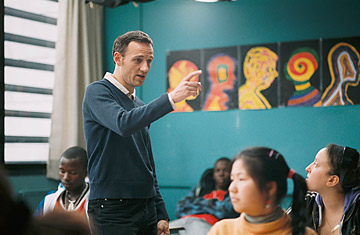
François Begaudeau in Laurent Cantet's film The Class
Let me put this as simply as the film does: A man named François Marin (François Bégaudeau) teaches — or tries to teach — French to 14- and 15-year-old students in a coldly modern school in Paris. His classroom is not quite a blackboard jungle, but it does contain a marginally middle-class, ethnically mixed, psychologically fractious group of kids, who constantly challenge him with their lolling indifference, their angry outbursts, their perpetual edge-of-insolence attitudes. To be honest, we do not witness very many heartwarming pedagogical triumphs in director Laurent Cantet's The Class, which tracks the activities of Marin, his students, their parents and the other teachers for an academic year, from the first day of school in the fall to the last day in the late spring.
One of the several remarkable things about this austere and masterly movie — which may remind cinephiles of the calm clarity and seeming simplicity of the French master, Robert Bresson — is that Bégaudeau is playing a version of himself, in a screenplay of his own devising that is in turn based on a novel that he also wrote. It is hard to think of another film more tightly autobiographical than this one. It's even harder to think of other films that build so gripping a narrative out of a string of comparatively minor and disparate incidents. For its first few minutes The Class threatens to be just as boring as you probably remember high school to have been. But then one girl, previously one of Marin's better students, refuses to read aloud from a book and then angrily refuses to make a genuine apology to him in an after-class confrontation. From that point onward, things pretty much run downhill for M. Marin. (See the top 10 movies of 2008)
Yes, he has a limited triumph in getting his students to write "self-portraits," which reveal them, on the whole, to be addled by pop music, soccer, video games and hanging out in the hood. The emotional climax of the film comes when, angered by the behavior of two of his female students, who sit on a sort of school governing board, he tells them they're acting like "skanks." They deliberately misread his remark — no he didn't actually call them a bad name, which they take to be a synonym for "whores" — but it doesn't matter. There's a classroom confrontation with an African student who rises to their defense, blood is accidentally spilled and the boy is threatened with expulsion — which in his case means expulsion not just from school but very likely, given his father's sternness, from France itself.
For Marin, this becomes a moral crisis, and it must be said that neither here nor elsewhere in the movie does Bégaudeau or Cantet take it easy on the teacher. Like all the other caring and humane faculty members — maybe the film could use one or two cynics — he's obviously committed to his work and supple in his attempts to engage his students. But there is a certain self-righteousness in him, bordering on arrogance, that can be tough to take. He is not exactly Mr. Chips. On the other hand, the film makes it obvious that eccentric, sweet-souled, old-school schoolmasters would last about five minutes in a modern high school — and not only in working-class Paris, where every day presents its minor melodramatic possibilities and generally realizes them.
But perhaps the most remarkable thing about The Class is its conclusion. After all the edgy incidents it offers, when we come to the last day of school, the students are hard-pressed to recall anything useful or even memorable that they learned. They have, in effect, been babysat, kept off the streets. We gain the strongest impression of the education machinery taking a little rest before clanking onward, in the largest sense indifferent to the needs of its charges, the best efforts of its functionaries. We guess that the smart kids will come out all right finally. We also guess that none of the troubled ones will suddenly become untroubled, saved somehow from mediocrity or worse. In its appraising reserve, its avoidance of sentimentality, its insistence on the quotidian realities of the faltering educational system, The Class comes — quietly — as close to greatness as any movie released this year.
See pictures of movie costumes.
See TIME's Person of the Year, People Who Mattered, and more.
